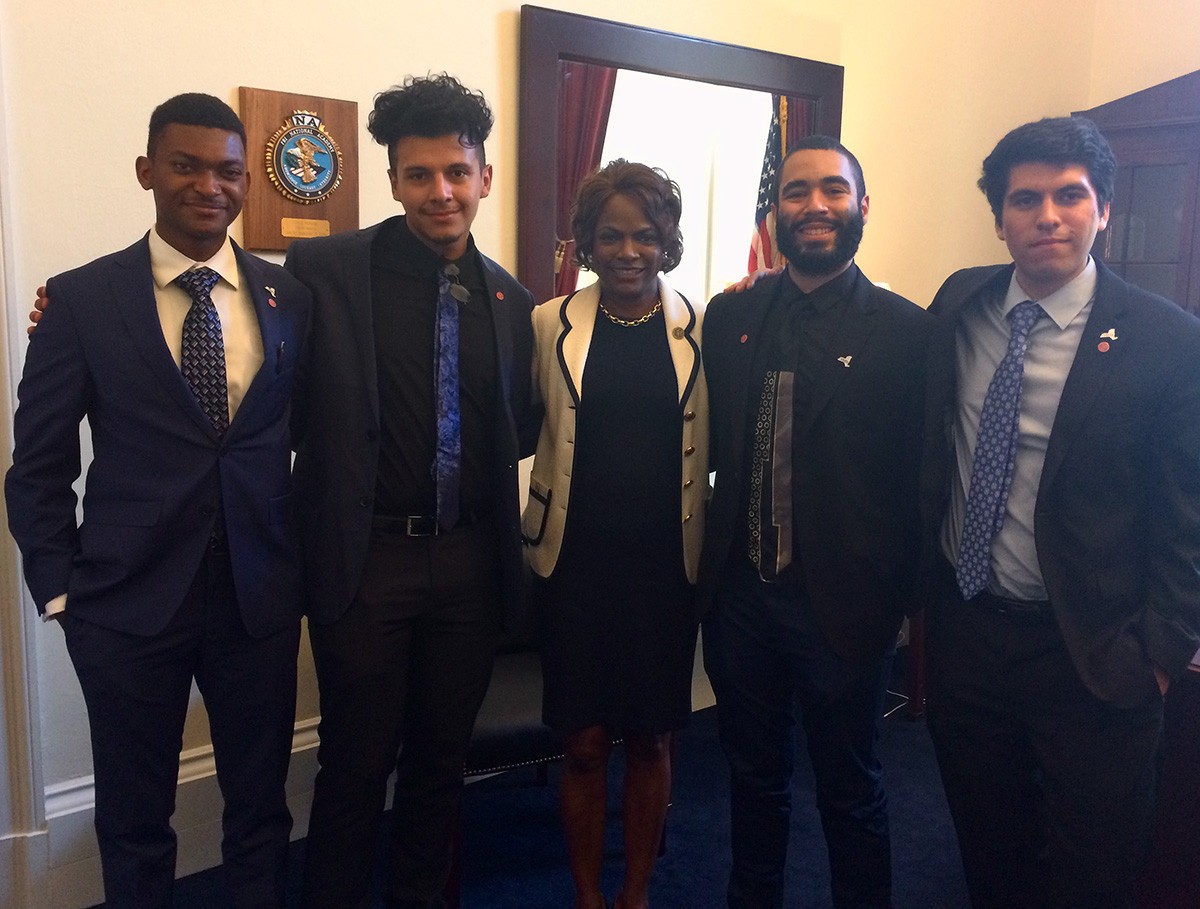McNair scholars advocate on Capitol Hill for TRIO programs
By Daniel Aloi

Thirteen students participating in federally funded TRIO programs at Cornell went to Capitol Hill June 28-29 and met with their members of Congress and legislative staff to advocate for the programs.
Eleven undergraduates in the Ronald E. McNair Post-Baccalaureate Achievement Program and two high school students in the Upward Bound program participated in the trip. The TRIO Advocacy Day was organized by Cornell’s Office of Federal Relations in Washington and the Office of Academic Diversity Initiatives (OADI).
“It was a great opportunity for the students to take what they have learned through their college experience, to demonstrate what they know and how their research is going to benefit society,” said Tremayne Waller, director of Cornell’s McNair Scholars Program and Student Success Programs in OADI.
McNair and Upward Bound are two of the eight TRIO programs funded by the U.S. Department of Education that assist in academic progress for individuals from disadvantaged backgrounds. Specifically, the McNair program helps prepare first-generation, low-income and underrepresented college students for Ph.D. programs in all fields of study. Similarly, the Upward Bound program prepares first-generation and low-income high school students for enrollment into a college or university. In a fiscal year 2018 budget proposal, the Trump administration called for a 10 percent cut in funding for TRIO programs, and eliminating the McNair program entirely.
The students “were able to advocate that the program is a springboard for those marginal groups, especially low-income students,” Waller said.
During TRIO Advocacy Day, students broke into two groups and covered about nine miles on foot to visit the offices of 21 Senate and House members from seven different states, armed with their research and information on Cornell and the McNair program. They were accompanied by Waller; Elena Guzman, a former McNair and Mellon-Mays scholar; and Dianne Miller and Kristen Adams, director and assistant director of federal relations for Cornell.
“[The McNair program teaches] you how to find your niche in research, and once you’re in they support you in every way necessary,” said Rosario Majano ’18, a first-generation student from Stockton, California, who entered the program as a sophomore. In Washington, she met with the staffs of California Sens. Dianne Feinstein and Kamala Harris, and with 9th District Rep. Jerry McNerney.

“The goal was to give a face to the program,” she said. “We talked about how a lot of us wouldn’t be able to do research, go to national conferences or be in a position to apply for graduate school without McNair.”
Majano majors in global and public health sciences in the College of Human Ecology and is conducting research with associate professor Anthony Burrow, exploring the role of purpose in sexual risk-taking. She plans to pursue a doctorate in sociology, and wants to become a mentor to younger students and join a university as a faculty member.
“The paying it forward aspect is really important,” she said. “I came away really motivated. I think we’re really changing the demographics of higher education and increasing the diversity of researchers, and that’s always important.”
Chemistry major Alex Martell ’19 presented research on using polymers to alter water absorption properties of cotton fabrics that “was fascinating” to a group at the Council for Opportunity in Education, Waller said. The research could lead to improved safety gear for firefighters and applications in functional clothing such as athletic wear.
A legislative staff member in New York Rep. Yvette Clarke’s office “was very intrigued with the research on breast milk” presented by biological sciences major Dainelle Allen ’18, Waller said. The staffer “does a lot of policy writing on the topic, and they had a dialogue on sharing the research,” with the hope that it could help influence policy.
Cornell’s McNair scholars participate in summer research and academic programs on campus and at other universities, and in internships. All 15 rising seniors in the McNair program are doing summer research, and eight of the seniors will participate in the Research Experience for Undergraduates program supported by the National Science Foundation (NSF). Since the program began in 2012, six McNair scholars from Cornell have won NSF Graduate Research Fellowships, three in 2017 alone.
The 31 current McNair scholars at Cornell have an average 3.41 cumulative grade point average. Waller notes that of the recent Class of 2017’s 13 McNair scholars, 12 (91 percent) were accepted to graduate schools. Since 2014, 32 Cornell McNair scholars have gone on to graduate or professional degree programs.
“They are doing great work at Cornell because of great resources, and the funding and support they get helps them to navigate college,” Waller said. “The opportunity that the funds provide gives them a leg up. If you have funds and come into a faculty member’s lab, that’s a resource. Instead of struggling and trying to figure it out yourself, we can provide these structured opportunities.”
Media Contact
Get Cornell news delivered right to your inbox.
Subscribe